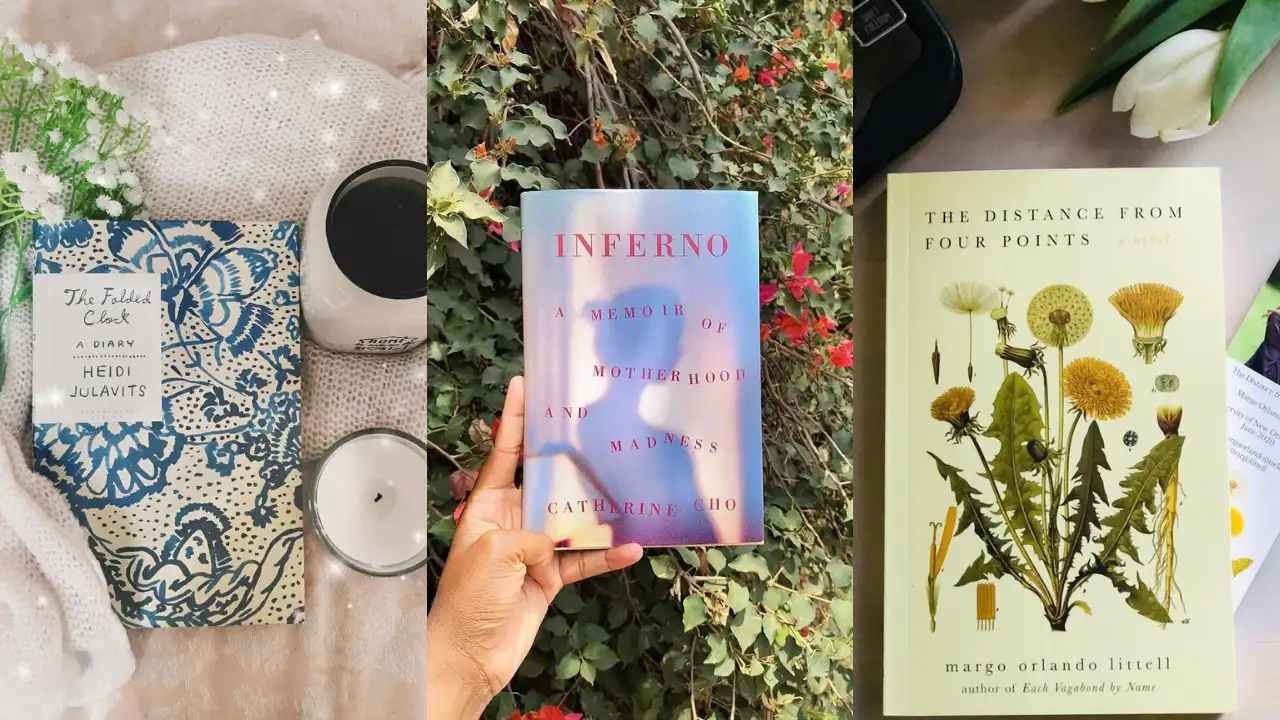Copyright timesnownews

Have you ever opened a book and felt like you were talking to the person you used to be? Some stories don't just entertain us. They pull us back to forgotten versions of ourselves, whispering truths we once knew but somehow lost along the way. These ten books are like sitting alone at midnight, having honest conversations with your past self about dreams, mistakes, and everything that shaped who you've become. Also Read: 10 Books That Feel Like Conversations With Someone Wiser 1. Crying in the Bathroom by Erika L. Sánchez A Mexican American writer reflects on growing up in a working-class immigrant family in Chicago, dealing with depression, and finding her identity as a woman and artist. Erika L. Sánchez writes about the pressure to be the good daughter, the guilt of wanting more, and the struggle between tradition and independence. She shares her experiences with mental illness, hospital stays, and the small joys that kept her going. Sánchez also explores how culture and gender expectations shaped her self-worth and ambitions. Her honest and funny voice makes even heavy moments feel comforting, like a talk with a friend who tells the truth without pretending to have all the answers. 2. Inferno: A Memoir of Motherhood and Madness by Catherine Cho Soon after giving birth, a Korean American woman suffers a sudden psychotic break, convinced her family is in danger and that reality itself is falling apart. Catherine Cho writes about her hospitalisation, the terror of losing touch with her own mind, and the slow path to recovery. She connects her illness to family trauma, cultural expectations, and the hidden weight of always appearing perfect. The memoir moves between her time in the hospital and moments from her past, revealing how long-buried pain contributed to her collapse. Cho’s story captures the fear of not trusting your own mind, the shame around mental illness, and the fragile hope of rebuilding after everything you once believed about yourself disappears. 3. No One Belongs Here More Than You by Miranda July This story collection follows people trying to make sense of loneliness and desire, each finding strange ways to create meaning in their lives. Miranda July writes about characters whose private worlds do not match reality but make perfect sense to them. Some women swim in strangers’ pools, children inventing rituals, and adults whose relationships rest on silent agreements. July shows how people hide their odd habits while longing for connection, how we all act normal even when we feel far from it. Her characters crave closeness but fear vulnerability, often pulling back when it matters most. The stories feel like quiet confessions, the ones you might share only in the middle of the night, about the private weirdness that makes you human. 4. The Folded Clock by Heidi Julavits A writer keeps a diary for a year, noting everyday details, fears about ageing and motherhood, and reflections that turn simple events into deep questions. The diary moves between past and present, memory and daily experience, forming a collage of thoughts rather than a straight timeline. Julavits writes about her marriage, her mother, dreams that blur sense and nonsense, and the quiet anxiety of trying to be everything at once. She wonders if keeping a diary is self-absorbed or healing, if understanding yourself helps or hurts, and if self-reflection ever leads to clarity. The book feels like hearing someone’s most honest thoughts, the kind you have late at night when replaying choices and wondering if you are getting anything right. 5. The Chronology of Water by Lidia Yuknavitch Told in short, powerful fragments, this memoir traces a life marked by pain, loss, and eventual rebirth. Lidia Yuknavitch writes about surviving her father’s abuse, the death of her newborn daughter, addiction, and failed relationships. She also writes about swimming, the one constant that gives her peace and purpose. Water becomes both her escape and her salvation. The book avoids linear storytelling, moving instead through emotions and memories that repeat and shift like waves. Yuknavitch writes openly about sex, trauma, and the body without shame, showing how art can transform pain into meaning. Her story is about learning to breathe again after drowning in the past. 6. Another Bullshit Night in Suck City by Nick Flynn Working at a homeless shelter in Boston, a young man encounters his estranged father among the people he is helping. The father is a drunk and a dreamer who believes he is a great writer waiting for recognition. Nick Flynn writes about this painful reunion, his mother’s suicide, and his own battle with addiction and guilt. The book moves between father and son, showing how their lives echo each other despite years apart. Flynn explores how addiction, pride, and shame pass through generations, and whether understanding someone’s suffering is enough to forgive them. The writing feels raw and poetic, filled with fragments that mirror the confusion of trying to make sense of a broken family. 7. Between Two Kingdoms by Suleika Jaouad At twenty-two, Suleika Jaouad is diagnosed with leukaemia and begins years of exhausting treatment that isolates her from the world. She writes about hospital life, the loss of normal time, and the strange jealousy she feels toward people who get to live ordinary days. When she finally enters remission, she sets out on a road trip across America to meet the readers who followed her cancer column. Along the way, she searches for what it means to live after surviving. Jaouad’s story is not just about illness but about finding a new sense of self after everything familiar is gone. It is about starting again when the life you planned no longer exists. 8. This Time Tomorrow by Emma Straub On her fortieth birthday, Alice wakes up as her sixteen-year-old self, with the chance to relive her past knowing everything she knows now. She feels stuck in her current life, especially while watching her father fade away from illness. Emma Straub uses this time-travel idea to explore what we would change if we could and what we might leave untouched. The story moves between Alice’s teenage years and her adult present, showing how memory can distort the past and how regret often hides love. It asks whether we could really choose differently if given another chance, or if every wrong turn was somehow part of what made us who we are. 9. How We Are Hungry by Dave Eggers These stories follow travellers and wanderers trying to fill a hunger they cannot name. Dave Eggers writes about people running from comfort in search of purpose, about friendships tested in distant places, and about the restlessness of modern life. His characters chase meaning through movement but often find that they cannot escape themselves. Eggers shows how even privilege brings confusion, how self-awareness does not guarantee peace, and how longing itself can be both a curse and a fuel. The stories feel like quiet talks about whether our lives mean anything and whether wanting more is a problem or just part of being human. 10. The Distance from Four Points by Margo Orlando Littell After her husband’s sudden death, a woman moves with her young son to a small Pennsylvania town, trying to build a new life while carrying her grief. Margo Orlando Littell writes about loneliness, guilt, and the strange rhythm of life after loss. The main character struggles with falling in love again and wonders if moving forward means forgetting. The novel explores how grief never follows neat stages, how people expect you to heal faster than you can, and how starting over can feel like betrayal. Littell captures the confusion of becoming someone new after tragedy, while still trying to honour who you once were. Also Read: 10 Books That Make the Past Feel Like It’s Happening to You These books are more than paper and ink. They're mirrors reflecting who we were and compasses pointing toward who we're becoming. Each page turns into a bridge between past and present, reminding us that growth isn't about forgetting our former selves but understanding them better. Sometimes the most important conversations we'll ever have are the ones we have with ourselves, and these stories make those midnight talks possible.



